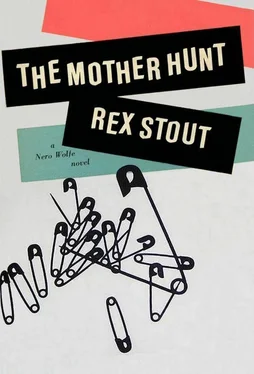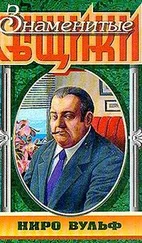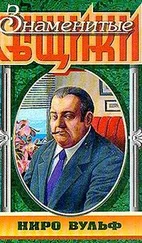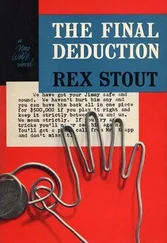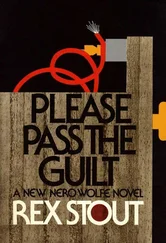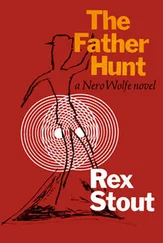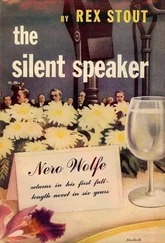Besides the niece, Anne, the only surviving relatives were a brother and his wife, Anne’s parents, who lived in California. Anne was refusing to talk to reporters, but Lon said that apparently she hadn’t seen her aunt very often and didn’t know much about her.
When I had got up to go Lon had said, “All take and no give, all right, there’s still a balance. But I can ask a question. Did you find the buttons? Yes or no.”
Having played poker with him a lot of nights, I had had plenty of practice handling my face in his presence. “If you had a trained mind like me,” I said, “you wouldn’t do that. We ran that ad, and now we want to know about Ellen Tenzer, so you assume there’s a connection. None at all. Wolfe likes white horsehair buttons on his pants.”
“I raise.”
“For his suspenders,” I said, and went.
The phone call from Nicholas Losseff came Saturday afternoon. I had been expecting it, since of course Anne Tenzer would have told the cops that Archie Goodwin was from the Exclusive Novelty Button Company, and they would see him, and no one enjoys talking with homicide dicks. So he would be sore. But he wasn’t. He only wanted to know if I had found out where the buttons came from. I asked him if he had had official callers, and he said yes, that was why he thought I might have news for him. I told him I was afraid I never would have, and then he was sore. If I ever get as hipped on one thing as he was, it won’t be buttons.
Anne Tenzer phoned Sunday morning. I was expecting that too, since my name had been in the papers’ accounts of the developments in what the News called the baby-sitter murder. One paper said I was Nero Wolfe’s assistant and another said I was his legman. I don’t know which one Anne Tenzer had seen. She was sore, but she didn’t seem to know exactly why. Not that she resented my pretending to be a button man, and not that she blamed me for what had happened to her aunt. When we hung up I took a minute to consider it and decided that she was sore because she was phoning me. It might give me the false impression that she wanted to hear my voice again. Which it did. Granting it was false, she should have settled on exactly what she was sore about before she dialed.
Nobody is ever as famous as he thinks he is, including me. When, keeping an appointment I had made on the phone, I pushed the button in the vestibule on West Eleventh Street, Sunday morning, and was admitted by Marie Foltz, there was no sign that she had seen my name in the paper. I was just an interruption to what she had been doing. And when I entered the big room one flight up and approached the client, who was at the piano, she finished a run before she turned on the bench and said politely, “Good morning. I suppose you have news?”
My tongue wanted to ask if she had ever finished the martini, but I vetoed it. “Of a sort,” I said. “If you have seen the morning paper—”
“I’ve seen it but I haven’t read it. I never do.”
“Then I’ll have to brief you.” I got a chair and moved it up to a polite distance, and sat. “If you never read the papers I suppose you didn’t see Mr. Wolfe’s ad on Thursday.”
“No. An ad?”
“Right. You may remember that I thought the buttons on the overalls were unusual, and he thought so too. The ad offered a reward for information about white horsehair buttons, and we got some. After some maneuvering that wouldn’t interest you, I went to Mahopac Friday morning — do you know where Mahopac is?”
“Of course.”
“And called on a woman named Ellen Tenzer, having learned that she made white horsehair buttons. We have now learned more about her, not from her. She made the buttons that are on the baby’s overalls. And the baby came from her house. It’s a small house, no one lived there but her, except the baby. It was there about three months.”
“Then she’s the mother!”
“No. For various good reasons, no. I won’t—”
“But she knows who the mother is!”
“Probably she did. At least she knew where she got it and who from. But she won’t tell because she’s dead. She was—”
“Dead?”
“I’m telling you. After a short talk with her Friday morning I left to get to a phone and send for help, and when I got back to the house her car was gone and so was she. I spent three hours searching the house. I’m reporting only the details that you need to understand the situation. Ellen Tenzer never returned to her house. At six o’clock yesterday morning a cop found a dead woman in a parked car — here in Manhattan, Thirty-eighth Street near Third Avenue. She had been strangled with a piece of cord. It was Ellen Tenzer, and it was her car. You would know about that if you read the papers. So she can’t tell us anything.”
Her eyes were wide. “You mean ... she was murdered?”
“Right.”
“But what— That’s terrible.”
“Yeah. I’m describing the situation. If the police don’t already know that I was there and combed the house, including the cellar, they soon will. They’ll know that right after I talked with her she drove away in her car, and that about fourteen hours later she was murdered. They’ll want to know why I went to see her and what was said. The what was said is no problem, since we were alone and she’s dead, but why I went is harder. They’ll know I went to ask about buttons, but why? Who was curious enough about buttons to hire Nero Wolfe? They’ll want the client’s name, in fact they’ll demand it, and if they get it you will be invited to the District Attorney’s office to answer questions. Then they’ll get theories, and probably one of the theories will be that the baby wasn’t left in your vestibule, that’s just your story to account for having it in your house, and investigating that theory will be a picnic. Your friends will get a big kick out of it. The point is—”
“No!”
“No what?”
“I don’t— You’re going too fast.” She was frowning, concentrating. “That’s not a story. The baby was left in my vestibule.”
“Sure, but it’s not a bad theory. I’ve known a lot worse. The point is that if we name the client you’ll be in for a little trouble, even if they don’t happen on that particular theory. And if we refuse—”
“Wait a minute.” Her frown was deeper.
I waited more than a minute while she sorted it out. “I guess I’m confused,” she said. “Do you mean that woman was murdered on account of — because you went to see her? What you said or something?”
I shook my head. “That’s not the way to put it. Put it that she was probably murdered — very probably — because someone didn’t want her to tell something or do something about the baby that was left in your vestibule. Or put it that if the inquiry about the baby hadn’t been started and got to her, she wouldn’t have been murdered.”
“You’re saying that I’m responsible for a murder.”
“I am not. That’s silly. Whoever put the baby in your vestibule with that note pinned to it must have known you would try to find out where it came from. The responsibility for the murder belongs to him, so don’t try to claim it.”
“I hate it.” She was gripping the edges of the bench. “I hate it. Murder. You said I would be invited to the District Attorney’s office. The questions, the talk—”
“There was an if, Mrs. Valdon. If we name the client. I started to add—”
“Why don’t you call me Lucy?”
“Tell me to in writing and I will. You’re very giddy for a girl who doesn’t know how to flirt. I started to add, if we refuse to name the client we may be in trouble, but that’s our lookout. We would rather not name you, and we won’t, if. If you won’t name yourself.”
Читать дальше
